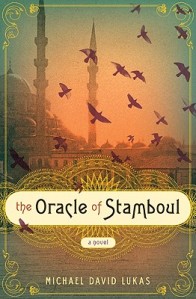 Title: The Oracle of Stamboul
Title: The Oracle of Stamboul
Author: Michael David Lukas
ISBN: 9780062036834
Pages: 304
Release date: February 2011
Publisher: 1817 Harper (HarperCollins)
Genre: Fiction
Format: Paperback
Source: TLC Book Tours
Rating: 3.5 out of 5
Summary
Eleonora Cohen is not like other little girls.
First, there was her birth. During an agonizing labor, which Eleonora’s mother does not survive, a flock of unusually colored hoopoes begin roosting outside the Cohens’ door, and the flock stays to watch over the young girl’s life.
Then, there is her unusually sharp memory. She learns to read and write in one afternoon, and soon begins contradicting shopkeepers when they give her aunt-turned-stepmother, Ruxandra, the wrong change.
When her father, Yakob, travels to Stamboul to reinvigorate his carpet business, Eleonora decides to stow away on his steamer. In the meantime, Yakob befriends the Reverend James Muehler, an American college rector with suspicious ties to both American and Ottoman espionage departments.
Yakob and Eleonora arrive in Stamboul, and Yakob’s host, Moncef Barcous Bey, takes an instant liking to Eleonora and insists that she stay for the entire visit. But when tragedy strikes, Eleonora’s stay at the Bey’s magnificent house lengthens and her previous enchantment with the bustling city begins diminishing.
When Eleonora learns of the prophecy that foretold her birth and the power that she would wield in the Empire, she begins to understand how different she really is. Will she push through her grief and indecision to serve her country faithfully, or is there something else in store for this unlikely oracle?
Analysis
Lukas does a good job of showing, not telling; I slowly began to dislike Reverend Muehler, but the author never makes an outright judgment of his character. Similarly, with just one sentence you get an immediate picture of the Sultan’s Grand Vizier: “A nervous man in a white silk robe and green turban, he had the aspect of a well-fed rodent and eyes the color of unripe grapes.”
Lukas’s carefully wrought prose is remarkable for a first-time author. He allows brief moments of poetry that don’t derail or encumber the story:
Summer slipped into Stamboul under the cover of a midday shower. It took up residence near the foundations of the Galata Bridge and drifted through the city like a stray dog. Ducking in and out of alleyways, the new season made itself felt in the tenacity of fruit flies buzzing about a pyramid of figs, in the increasingly confident tone of the muezzin, and the growing petulance of shopkeepers in the produce market.
His measured, steady pacing, even during exciting parts, can be frustrating at times, but it succeeds in making the story seem like a folktale or a historical account.
Leave it to me to begin categorizing as many fairy-tale elements as I could find. A plethora of birds grace the novel, from Eleonora’s unlikely flock to the Sultan’s bird-watching endeavors; birds are some of the most popular animals in fairy tales, from Mother Goose to the Ugly Duckling.
Eleonora’s voicelessness for part of the novel is reminiscent of “The Little Mermaid”; Eleonora’s grief and powerlessness manifest themselves in her silence, and she remains mute until she makes the conscious decision to move beyond her own pain.
She had not thought about speaking, or not speaking, for some time now. Her silence was a comfortable habit—the listening, the nodding, the writing out of any responses that were absolutely necessary—but it had long ago lost its power. She realized this now, now that she had discarded the cloak of voicelessness, letting it pool at her feet. The spell was her own to break; it had been all along.
The story features other literary influences prominently as well. Eleonora’s voracious literary appetite leads her to a book called The Hourglass. This book’s characters and storyline help Eleonora make decisions that require wisdom and experience beyond her years.
However, sometimes Lukas takes his metaphors a little too far, as when describes the Sultan eating an entire chicken: “When he was finished with the chicken, its carcass lay ravaged on the plate like some wayward harlot.” Uh, what? That’s a little too close to a line I’d expect to hear in some corny slasher flick.
In an interview about this book, the author has stated that there are many lessons to be learned from the sprawling, multiethnic Ottoman Empire. For example, when the Bey invites Muehler over for dinner and the Reverend attempts to talk politics, I can’t help but think about current domestic and international affairs:
[Reverend Muehler:] “I have not seen such commotion and disorder since our Civil War. Mahdists, Serbs, Armenians, Jews, all clamoring for who knows what. The whole world seems to be clamoring.”
The Bey nodded philosophically.
“Clamor can be an end unto itself,” he said.
“Some would say a new day is dawning.”
“Some would say many things.”
I found this observation particularly interesting in light of recent unrest in Tunisia and Egypt; many commentators on politics in those regions today are similarly divided.
This book is a good choice if you are interested in history, particularly of the Ottoman Empire; I’ll admit I didn’t know much about that region’s history, so I still feel a little puzzled about certain references. However, I don’t think it impeded my overall understanding of the book or its events.
Categories: 3-3.5 stars, Book Reviews









This is a bit of history that I’m not really familiar with so I’m really excited to read a book set in this time and place – I love learning new things as I read, and I think this is the perfect book for that.
Thanks for being a part of the tour!
LikeLike
Melody, this book sounds really interesting! Thanks for reviewing it and giving me enough that I am intrigued. I do love history, so maybe I will look this one up… 🙂
LikeLike